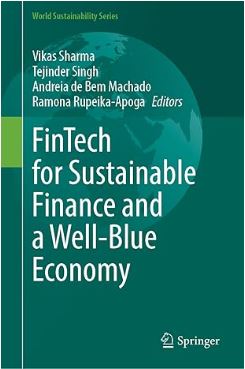Springer Cham
FinTech for Sustainable Finance and a Well-Blue Economy (World Sustainability Series)
FinTech for Sustainable Finance and a Well-Blue Economy (World Sustainability Series)
Couldn't load pickup availability
E-Book
After purchasing your eBook(s), you will receive the redemption code(s) via email to access the book(s). The codes will be sent within 2 business days.
Editors:
Vikas Sharma, Tejinder Singh, Andreia de Bem Machado, Ramona Rupeika-Apoga
ISBN: 9783031923906
Published: 23 August 2025
Pages: 382. 20 b/w illustrations, 37 illustrations in colour
Format: E-Book
Publisher: Springer Cham
Description:
This book explores how financial technology (FinTech) can drive sustainable practices within the blue economy, which revolves around the responsible use of ocean and water-based resources. It highlights how innovations such as blockchain, artificial intelligence (AI), and digital finance can promote environmental sustainability, economic growth, and social equity. By integrating these technologies, the book provides insights into building resilient, well-managed ecosystems that contribute to a stable and prosperous world economy.
The blue economy includes sectors like fisheries, aquaculture, tourism, shipping, and marine renewable energy, all of which require sustainable resource management to thrive. FinTech offers new ways to align financial flows with sustainability goals, channelling investments into eco-friendly marine projects and creating microfinance opportunities for coastal communities. The book emphasizes how green financing, supported by FinTech platforms, can mobilize capital for sustainable initiatives such as marine conservation and renewable energy production.
A significant focus of the book is the role of blockchain and AI in enhancing transparency and efficiency. Blockchain helps trace supply chains, reducing illegal fishing and promoting sustainable sourcing, while AI supports predictive tools for resource management and operational efficiency in industries like aquaculture. These technologies enable stakeholders to make data-driven decisions that foster both environmental preservation and economic profitability.
The social dimension is also critical, as the book discusses how FinTech can promote financial inclusion in vulnerable coastal communities. Digital finance tools, such as mobile banking and peer-to-peer lending platforms, empower small businesses and individuals, creating sustainable livelihoods aligned with ocean conservation.
Governance and policy frameworks are explored, showing how FinTech can enhance transparency, accountability, and cooperation between public and private sectors. The book examines how governments, financial institutions, and technology providers can design policies that encourage responsible economic practices while protecting marine ecosystems.
About the editors
Dr. Vikas Sharma is a professor at the University School of Business at Chandigarh University. His academic journey includes a specialized Master's in Business Administration (MBA) with a focus on Finance, followed by a Ph.D. in Management concentrated on Finance and Accounting. With a cumulative experience of 16 years in academia and professional spheres, Prof. Sharma possesses a deep understanding and expertise in his field.
His contributions include impactful research publications, reflecting his dedication to generating insightful academic content. In addition to his scholarly endeavors, he has developed strong competencies in administrative support and data analysis. Prof. Sharma is actively seeking an engaging opportunity within the finance sector to further apply and expand his expertise and capabilities.
Dr. Tejinder Singh holds a Ph.D. in Equity Derivatives and brings over 22 years of experience across industry and academia as a corporate trainer and financial education trainer. He has earned a national record for conducting the inaugural batch of the “Basics of Agriculture-Commodity Derivatives Trading” course on the Skill India Portal. His expertise is recognized through his published Scopus-indexed papers in banking and finance, and he serves as a resource person with the National Institute of Securities Markets (NISM). He is also a certified alternative investment fund trainer, holding certification in NISM Series XIX-A-Alternative Investment Funds.
Dr. Andreia de BemAndreia de Bem Machado (Ph.D. in Engineering and Knowledge Management) is a researcher at the Innovation Intelligence, Management and Technology Research Center-IGTI at the Federal University of Santa Catarina. She is an adjunct professor and research coordinator at Faculdade Anasps Brasília-Brazil. She is an evaluator of higher education institutions for the Brazilian Ministry of Education and director of Education at the Municipal Department of Education in Palhoça-Santa Catarina-Brazil. She was part of the technical committee for the Ministry of Education's National Textbook Programme. She has developed teaching materials for people with low vision at UNESCO. Her research interests include: innovation, education, digital transformation, management, hybrid education, digital technologies, active methodology, knowledge media, entrepreneurship, knowledge management, digital transformation, and environmental, social, and governance.
Prof. (Dr.) Ramona Rupeika-Apoga Ph.D., Social Science, University of LatviaRamona Rupeika-Apoga, is a professor of Finance at the University of Latvia and the Head of the Department of Finance and Accounting. She holds the positions of a visiting professor at the University of Lodz in Poland and an affiliate professor at the University of Malta. The professor has over 20 years of pedagogical experience in Latvian and European higher education institutions, with specialized knowledge in risk management, international finance, FinTech, and corporate digital transformation. She has led and participated in a number of international and local studies and research projects.
Why buy this book?
This book is a pioneering resource linking FinTech and sustainability in the blue economy, offering actionable insights into blockchain, AI, and green finance for academics, policymakers, and professionals. It provides both theoretical frameworks and real-world applications, making it essential for those aiming to align financial innovation with global sustainability goals.
Topics:
Sustainable Development, Environmental Economics, International Finance
Keywords:
FinTech, sustainable finance, blue economy, blockchain, AI, marine renewable energy, green finance, digital finance, financial inclusion, ocean sustainability
Target Audience:
Economists, Finance professors, Sustainability researchers, Policy makers, FinTech professionals, Environmental NGOs, Marine industry leaders, University libraries, Graduate students, Government institutions
Genres:
Economics, Finance, Sustainability, Environmental Studies, Technology
📘 Learn more about shipping, delivery times, and returns, see our FAQ here


